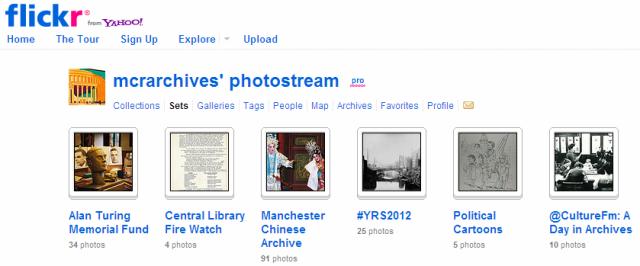As a sector, archives are well aware of the impact of the changing way we record and share information. The digital challenge is something that concerns us all. However, it may seem almost too daunting to start, particularly for those archivists working in smaller, less well-resourced archive services. Luckily, it has been a good summer for advice and guidance to help us all to tackle this challenge.

A screengrab of Manchester Archives+ flickr photostream: digital engagement is becoming a vital part of archive work across the UK
The Heritage Lottery Fund has published Thinking About Good Digital Practice, a guide to support their new policy which for the first time opens the fund to primarily digital projects. The guidance is helpful well beyond those intending to bid for Lottery funds, as it encourages effective planning and advises on how to get the best out of a project involving digital content. It outlines different options for digital projects and reminds us all of some of the key points to planning successful projects, particularly: what do you want to achieve and who is your target audience? Answers to those questions are critical if your work is to have the impact you hope and to justify the investment you are planning. Some of this advice is important for any project, digital or otherwise, but the guidance also gives a host of digital-specific information such as example costs for aspects of a digital project, good practice for file names and metadata, and some really helpful guidance about rights and permissions, issues which can seem very intimidating to newcomers to the subject. The guidance also helps to identify the staff and skills needed, the options for digital outputs, and how to keep digital outputs accessible, safe and findable in future.
One element stressed by the digital projects guidance is the importance of sustainable access to digital outputs from projects. This is a reminder that all archives are likely to be facing a requirement to think about preservation of born-digital materials, whether they are archive collections or records created by projects to open up the archives. Most archivists won’t need to be reminded of this looming issue, but it has always been easier to recognise the need for action than to know exactly what to do next. In that context, it’s very pleasing to see OCLC Research publishing a blissfully short and practical guide suggesting initial actions that any archive can take to get started. You’ve Got To Walk Before You Can Run, as the name suggests, is more concerned with practical first steps than with long term strategy. It offers ‘modest measures to allow those with unprocessed holdings to sleep peacefully, or at least nap without nagging doubt.’ As the report concludes, ‘You’ll want to do more when you can.’ We have guidance on, for example, Digital Preservation Policies, and some FAQs to help you get beyond the start. But making that start is essential.
As we continue to develop the Archives Sector area of The National Archives website, we’d be interested to hear what other guidance and case studies would help archivists to develop their work.

Belatedly adding, if you want to develop your thinking and skills around digital preservation, the next SPRUCE mashup event could be for you: http://www.jisc.ac.uk/events/2012/09/digitalpreservation.aspx